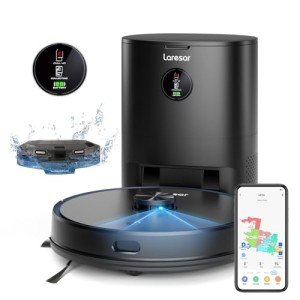20 Up And Coming Robot Vacuum Hoover Stars To Watch The Robot Vacuum Hoover Industry
The Evolution and Benefits of Robot Vacuum Hoovers
In the ever-evolving landscape of home automation, one device has actually become a game-changer: the robot vacuum hoover. These intelligent cleaning machines have actually transformed the way individuals maintain their homes, providing benefit, effectiveness, and a touch of contemporary technology. robotic vacume explores the history, functions, advantages, and future of robot vacuum hoovers, supplying an extensive summary of this innovative household device.
The History of Robot Vacuum Hoovers
The principle of automated cleaning gadgets dates back to the early 20th century, but it wasn't up until the late 1990s and early 2000s that innovation advanced enough to make robot vacuum hoovers a practical truth. The first commercially effective robot vacuum, the iRobot Roomba, was introduced in 2002. Given that then, the market has seen an expansion of brand names and models, each offering distinct features and capabilities.
How Robot Vacuum Hoovers Work
Robot vacuum hoovers are equipped with sophisticated sensing units and algorithms that allow them to browse and clean efficiently. Here's a breakdown of the essential components and procedures:
Sensors and Navigation:
- Laser and Infrared Sensors: These sensors help the robot identify challenges and map the space.
- Cliff Sensors: Prevent the robot from dropping stairs or ledges.
- Bump Sensors: Allow the robot to navigate around furniture and other objects without getting stuck.
Cleaning Mechanisms:
- Brushes: Main and side brushes collect dust, dirt, and particles.
- Vacuum: Suction power differs by design, but all are created to get a wide range of particles.
- HEPA Filters: Some designs consist of HEPA filters to trap irritants and enhance air quality.
Battery and Charging:
- Rechargeable Battery: Most robot vacuums utilize lithium-ion batteries that last a number of hours on a single charge.
- Automatic Charging: When the battery is low, the robot go back to its charging dock to recharge.
Connection and Control:
- Wi-Fi and Bluetooth: Many designs can be managed via mobile phone apps, allowing users to schedule cleansings and monitor efficiency.
- Voice Control: Integration with smart home systems like Amazon Alexa and Google Assistant includes another layer of convenience.
Advantages of Robot Vacuum Hoovers
Convenience:
- Automated Cleaning: Robot vacuums can be set up to clean up while you are away or asleep, ensuring a tidy home without manual effort.
- User-Friendly: Most designs are easy to establish and run, making them accessible to users of all ages and tech-savviness.
Effectiveness:
- Thorough Cleaning: Advanced navigation systems ensure that the robot covers the entire floor location, including hard-to-reach spots.
- Energy Efficiency: Modern designs are created to be energy-efficient, reducing electrical power intake.
Health Benefits:
- Allergen Reduction: HEPA filters can trap irritants, improving indoor air quality and decreasing allergic reaction symptoms.
- Dust Control: Regular cleaning assists keep dust levels low, creating a much healthier living environment.
Time and Cost Savings:
- Time Savings: Automating the cleaning process releases up time for other activities.
- Expense Savings: While the initial financial investment may be higher, the long-lasting cost savings on cleaning products and expert cleaning services can be significant.
Picking the Right Robot Vacuum Hoover
When choosing a robot vacuum hoover, consider the list below elements:
- Cleaning Power: Look for designs with strong suction and efficient brush systems.
- Navigation Technology: Advanced navigation systems guarantee comprehensive cleaning and efficient movement.
- Battery Life: Choose a model with a long battery life and fast charging abilities.
- Smart Features: Wi-Fi connection, app control, and voice combination can enhance the user experience.
- Size and Design: Ensure the robot vacuum fits well in your home and can navigate under furniture and around obstacles.
Future Trends in Robot Vacuum Hoovers
The future of robot vacuum hoovers is amazing, with a number of emerging patterns:
- Improved AI and Machine Learning: Enhanced algorithms will make robots more intelligent, enabling them to find out and adjust to their environment.
- Integration with Smart Home Ecosystems: Greater combination with other smart home gadgets will develop a more seamless and automatic home experience.
- Advanced Cleaning Technologies: Innovations in brush style, suction power, and filter innovation will continue to improve cleaning performance.
- Sustainability: More eco-friendly products and energy-efficient styles will become basic.
Frequently asked questions
Q: How often should I clean my robot vacuum hoover?A: It's suggested to clear the dust bin and tidy the brushes after each use to maintain ideal efficiency. The HEPA filter must be cleaned or replaced every few months, depending on use.
Q: Can robot vacuum hoovers clean carpets?A: Yes, most robot vacuum hoovers are created to clean up both difficult floorings and carpets. Some models have adjustable suction settings for various floor types.
Q: Are robot vacuum hoovers loud?A: Generally, robot vacuums are quieter than traditional vacuum cleaners. However, the noise level can differ by design, so it's an excellent idea to examine reviews or requirements before acquiring.
Q: Can I use a robot vacuum hoover in several spaces?A: Yes, lots of models can clean up multiple rooms and can be set to tidy specific locations. Some advanced designs can even develop virtual borders to keep the robot in particular locations.
Q: How do I set up a robot vacuum hoover?A: Most robot vacuums come with easy to use setup directions. Typically, you need to charge the battery, place the robot in the starting position, and connect it to your Wi-Fi network if it has smart functions. From there, you can set up cleaning schedules and choices through the app or control board.
Robot vacuum hoovers have transformed home cleaning, offering a mix of benefit, performance, and advanced technology. As the marketplace continues to evolve, these gadgets are becoming more intelligent, flexible, and user-friendly. Whether you're wanting to conserve time, enhance your home's tidiness, or welcome the current in home automation, a robot vacuum hoover is a worthwhile financial investment.
